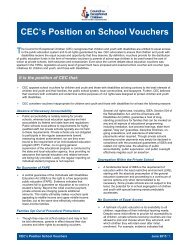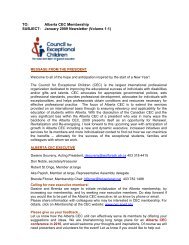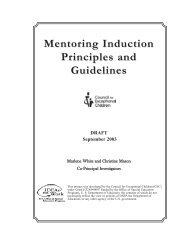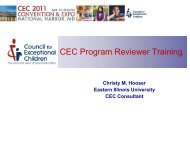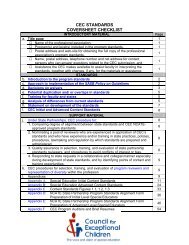What Every Must Know Special Educator - Council for Exceptional ...
What Every Must Know Special Educator - Council for Exceptional ...
What Every Must Know Special Educator - Council for Exceptional ...
You also want an ePaper? Increase the reach of your titles
YUMPU automatically turns print PDFs into web optimized ePapers that Google loves.
New arrangements and new provisions must be<br />
utilized, including freedom to pursue interests which<br />
might not fit the prescribed curriculum, opportunities<br />
<strong>for</strong> open blocks of time, opportunities <strong>for</strong> consultation<br />
with persons and use of resources external to the classroom,<br />
and opportunities to bypass those portions of<br />
the curriculum which have been previously achieved<br />
by the individual. These kinds of arrangements must<br />
present options across all educational settings and<br />
procedures within all programs <strong>for</strong> the gifted and<br />
talented, whether in the regular classroom or in highly<br />
specialized situations.<br />
<strong>Special</strong> education <strong>for</strong> the gifted and talented demands<br />
individualization within special programs in terms<br />
of student needs, as well as differentiation between<br />
programs <strong>for</strong> the gifted and talented and programs <strong>for</strong><br />
other children and adults.<br />
A program of special education <strong>for</strong> the gifted and<br />
talented should provide continuing and appropriate<br />
educational experiences from preschool into adult<br />
years.<br />
Paragraph 4 - Preparation of School<br />
and Leadership Personnel<br />
<strong>Special</strong> preparation is required <strong>for</strong> those educators<br />
who have either specific or general responsibilities <strong>for</strong><br />
educating the gifted and talented. Teachers and other<br />
professional educators who work with the gifted and<br />
talented need special training in both program content<br />
and process skills. Such training should be recognized<br />
by appropriate certification in the case of teachers<br />
and should receive the general support of local, state,<br />
provincial, federal, and private interests.<br />
Paragraph 5 - Demonstration Programs<br />
The preparation of school personnel in the education<br />
of the gifted and talented should be carried out in settings<br />
which permit opportunities to examine relevant<br />
research and to observe innovative administrative<br />
provisions and exemplary instruction. This requires<br />
extensive library services, ongoing research or access<br />
to such research, and most importantly, centers in<br />
which teachers may observe and try out new styles of<br />
teaching appropriate to the education of the gifted and<br />
talented.<br />
<strong>Special</strong> model or demonstration programs should be<br />
established to illustrate to educators and others the<br />
kind and range of innovative program ef<strong>for</strong>ts that are<br />
possible and effective in the education of gifted and<br />
talented students.<br />
270 whAt every SpeCiAl eduCAtor muSt <strong>Know</strong><br />
Paragraph 6 - Research and Development<br />
Research and development resources should be focused<br />
on the needs of the gifted and talented in order<br />
to develop new methodologies and curricula and to<br />
allow educators and others to evaluate current and<br />
proposed methods.<br />
Paragraph 7 - Parents and the Public<br />
One responsibility of the special educator is to educate<br />
the parents of gifted and talented children concerning<br />
their children’s needs and rights.<br />
The educational needs of the gifted and talented also<br />
warrant planned programs of public in<strong>for</strong>mation,<br />
particularly at the local community level. <strong>Special</strong><br />
educators should accept these responsibilities as an<br />
important part of their professional involvement.<br />
Para. 8 - Financial Support<br />
Although programs <strong>for</strong> the gifted and talented can<br />
sometimes be initiated at relatively modest cost, it is<br />
important that funds <strong>for</strong> this purpose be earmarked at<br />
local, state or provincial, and national levels.<br />
Principal expenditures should be directed toward the<br />
employment of leadership personnel, the development<br />
of methods and programs, and of particular importance<br />
at the local level, the preparation of persons <strong>for</strong><br />
the support and implementation of such methods and<br />
programs in the schools.<br />
The importance of optimal educational services <strong>for</strong> the<br />
gifted and talented merits the expenditure of funds in<br />
appropriate amounts toward this end by all levels of<br />
government as well as by other sources.<br />
ChAPTER 08<br />
EThNIC AND MuLTICuLTuRAL GROuPS<br />
Paragraph 1 - Preamble<br />
The <strong>Council</strong> believes that all policy statements previously<br />
adopted by CEC related to children with and<br />
without exceptionalities, as well as children with gifts<br />
and talents, are relevant and applicable to both minority<br />
and nonminority individuals. In order to highlight<br />
concerns of special interest to members of ethnic and<br />
multicultural groups, the following policy statements<br />
have been developed:




